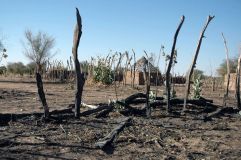Darfur clamped in bitter Sudan-Chad row
April 17, 2006 (CAIRO) — After three years of conflict and famine, Sudan’s Darfur region is exposed to more violence by a breakdown in relations between the government and neighbouring Chad, which has now abandoned its role as peace mediator.
 The Chadian delegation at African Union-sponsored peace talks in Nigeria announced it was walking out on Sunday following President Idriss Deby Itno’s decision to sever ties with the Sudanese government.
The Chadian delegation at African Union-sponsored peace talks in Nigeria announced it was walking out on Sunday following President Idriss Deby Itno’s decision to sever ties with the Sudanese government.
“There is no point in being mediators when we are the victims of Sudanese aggression right up to N’Djamena,” Foreign Minister Ahmat Allami said. “We cannot be part of a conflict and guarantee its mediation.”
The announcement came four days after Chadian rebels tried to topple Deby’s regime in what N’Djamena described as a coup attempt engineered in Khartoum.
The withdrawal of one of the key mediators dealt a further blow to peace talks which had made little progress since their launch in N’Djamena under Deby’s auspices two years ago, officials said.
Darfur rebels lamented the loss of a key champion in the talks and warned of dire consequences for the western Sudanese region, where up to 300,000 people are estimated to have died from the combined effects of war and starvation.
“Chad is very influential on all issues related to Darfur and without them as mediators in the talks, it will lead to a very dangerous situation,” said Ahmed Hussein, a senior negotiator for the Darfur rebels.
If Deby stays in power, Darfur risks becoming a proxy battlefield for two regimes at war. If he tumbles, Khartoum will have a free hand to press on with its brutal repression of the Darfur uprising, Hussein warned.
“We don’t want Darfur to become a battlefield for regional conflicts because our people suffer a lot… and if Khartoum gets what it wants and a new regime in Chad, it will be free to crush the rebellion in Darfur.”
Hussein — who represents the Justice and Equality Movement — and his counterparts from the Sudan Liberation Army (SLA), urged the international community to shore up peace efforts to prevent the area from tumbling into further chaos.
While the Nigeria talks are not officially dead, an African diplomat speaking on condition of anonymity admitted they had “lost a key broker, who played a central part in every mediation effort between the rebels and Khartoum.”
Sudan, which has vociferously denied any involvement in the failed coup attempt that left some 400 people dead last week, came to much the same conclusion.
“It is regrettable that Chad would break off its diplomatic relations with Sudan whilst mediating with other facilitators to achieve peace in Darfur,” Sudanese foreign ministry spokesman Jamal Ibrahim told AFP.
The UK-based anti-genocide watchdog Aegis Trust blamed the international community for failing to respond adequately to the situation in Darfur and allowing cross-border tension to fester.
“This latest crisis involving Chad is a warning symptom that the international community has dithered about security in Darfur for too long,” Aegis chief executive James Smith said.
He thought it unlikely that the latest row would kindle an all-out military confrontation between Sudan and Chad but warned of the heightened risk of a proxy war.
“The government of Sudan will likely continue to support Chadian rebels and the Chadian government will now be inclined to substantiate its support for the SLA,” Smith said.
However, he argued the Abuja peace talks could survive Chad’s boycott. “Chad was always an unhelpful choice as a co-mediator at Abuja as it has arguably been an interested party in the conflict from the outset.”
Abdalla Adam Khatir, a political commentator from Darfur who chairs the Sudanese Organisation for Popular Development, agreed that Chad was not irreplaceable as a broker.
“The move by Chad to break off diplomatic ties with Sudan and withdraw from the negotiations will not adversely affect the progress of the Abuja talks because they have gone a long way and are being held under the umbrella of regional and international organisations,” Khatir said.
Smith even hoped the latest developments would put pressure on Beshir’s regime to make efforts “to reach a settlement more than ever in the past two years”.
Under US-led pressure, the UN Security Council has turned up the heat on Khartoum in recent months and is due to convene next week to discuss sending a peacekeeping mission to Darfur to replace an overstretched AU force.
(ST/AFP)
